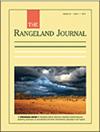Building human capacity, capability and future leaders for Australia’s rangelands
IF 0.9
4区 环境科学与生态学
Q4 ECOLOGY
引用次数: 1
Abstract
Maintaining a skilled, knowledgeable and adaptable workforce in Australian rangeland enterprises and research, development and extension/adoption (RD&E/A) organisations is a varied and challenging task, compounded by trends of sustained losses of human capacity through senior retirements and short-term appointments over the last decade. Concerns for how to fill these gaps while gaining the skills and knowledge needed for a successful career and leadership roles were raised by students and young professionals in the World Cafe session and throughout Early Career workshops and activities at the 2019 Biennial Conference of the Australian Rangeland Society (ARS). This paper responds to these expressed information needs through drawing on literature, experiences shared by session participants, and existing ARS members currently working in the rangelands in diverse roles to provide insights into two main areas: (i) skills and knowledge for personal development and future success in the rangelands across three broad classes of occupation/careers (i.e. advisors, researchers, and producers), and (ii) skills and knowledge that will be expected of future leaders in the rangelands. We outline a variety of options for professional development in the early stage(s) of a career working on aspects of sustainable production systems and pathways to leadership throughout a career in the rangelands. We note the apparent lack of formal rangeland-specific education in Australia, and suggest that this is a major impediment to efforts to build skills and knowledge to ensure the viability of the livelihoods and the integrity of our rangelands. Finally, we believe that the ARS has the potential to play a more central role in inspiring interest and passion for the rangelands, in providing current information on (i) range science and management-relevant education and training opportunities in Australia and internationally, and (ii) leadership development and training opportunities; and in facilitating and supporting mentoring to develop and retain human capacity for a resilient future.为澳大利亚牧场建设人力资源、能力和未来领导者
在澳大利亚牧场企业和研究、开发和推广/采用(RD&E/a)组织中保持一支技术娴熟、知识渊博、适应性强的劳动力队伍是一项多样化且具有挑战性的任务,过去十年中,由于高级退休和短期任命,人力资源持续流失的趋势加剧了这一任务。在世界咖啡馆会议以及2019年澳大利亚牧场协会双年度会议的早期职业研讨会和活动中,学生和年轻专业人士对如何填补这些空白,同时获得成功职业和领导角色所需的技能和知识提出了担忧。本文通过参考文献、会议参与者分享的经验,以及目前在牧场工作的现有ARS成员,以不同的角色提供对两个主要领域的见解:(i)在三大职业/职业类别(即顾问、研究人员和生产者)的牧场中个人发展和未来成功的技能和知识,以及(ii)牧场未来领导人所期望的技能和技能。我们概述了在职业生涯早期从事可持续生产系统方面的职业发展的各种选择,以及在牧场职业生涯中获得领导地位的途径。我们注意到澳大利亚明显缺乏针对牧场的正规教育,并认为这是培养技能和知识以确保生计的可行性和牧场完整性的主要障碍。最后,我们认为,ARS有潜力在激发人们对牧场的兴趣和热情方面发挥更核心的作用,提供有关以下方面的最新信息:(i)澳大利亚和国际范围内与牧场科学和管理相关的教育和培训机会,以及(ii)领导力发展和培训机会;以及促进和支持指导,以发展和保持人类能力,建设一个有韧性的未来。
本文章由计算机程序翻译,如有差异,请以英文原文为准。
求助全文
约1分钟内获得全文
求助全文
来源期刊

Rangeland Journal
环境科学-生态学
CiteScore
2.90
自引率
8.30%
发文量
14
审稿时长
>36 weeks
期刊介绍:
The Rangeland Journal publishes original work that makes a significant contribution to understanding the biophysical, social, cultural, economic, and policy influences affecting rangeland use and management throughout the world. Rangelands are defined broadly and include all those environments where natural ecological processes predominate, and where values and benefits are based primarily on natural resources.
Articles may present the results of original research, contributions to theory or new conclusions reached from the review of a topic. Their structure need not conform to that of standard scientific articles but writing style must be clear and concise. All material presented must be well documented, critically analysed and objectively presented. All papers are peer-reviewed.
The Rangeland Journal is published on behalf of the Australian Rangeland Society.
 求助内容:
求助内容: 应助结果提醒方式:
应助结果提醒方式:


